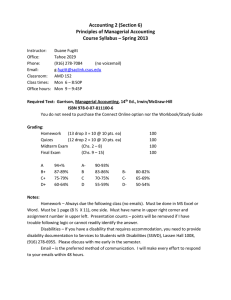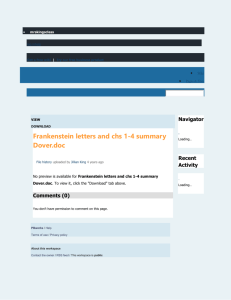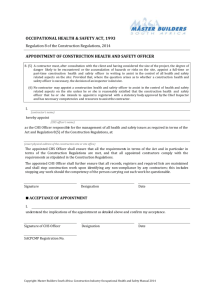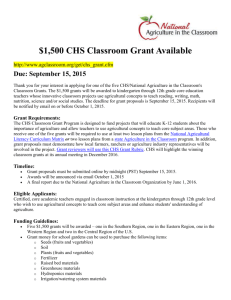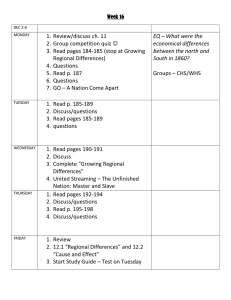ENL 3122, Section 1H64, Gibson
advertisement
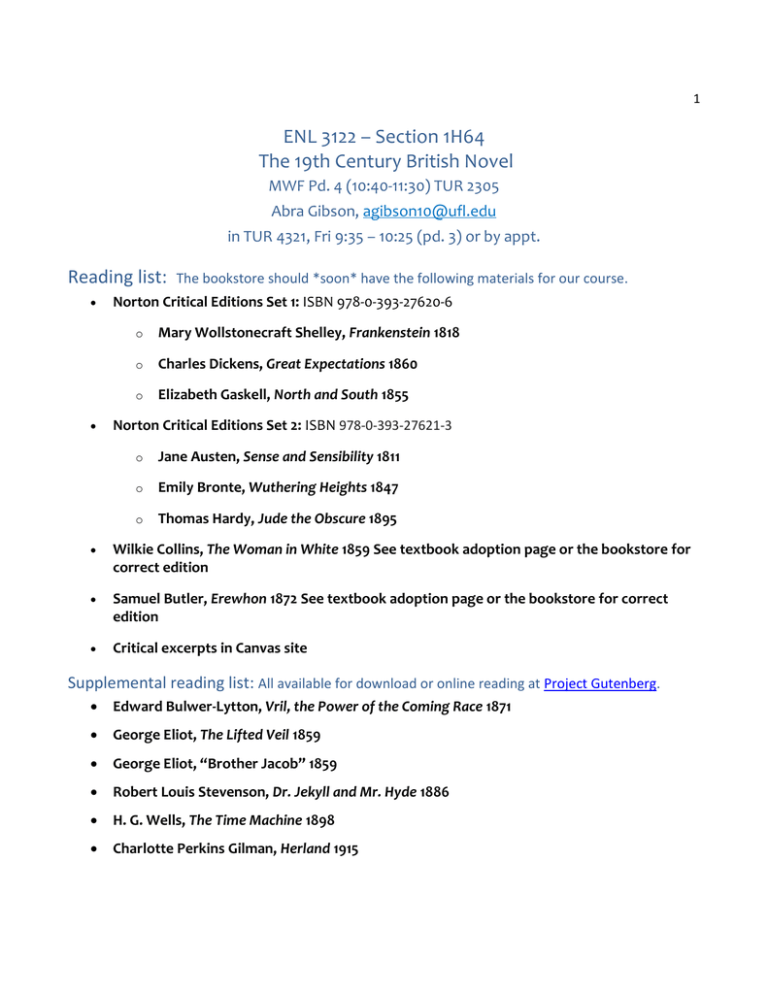
1 ENL 3122 – Section 1H64 The 19th Century British Novel MWF Pd. 4 (10:40-11:30) TUR 2305 Abra Gibson, agibson10@ufl.edu in TUR 4321, Fri 9:35 – 10:25 (pd. 3) or by appt. Reading list: The bookstore should *soon* have the following materials for our course. Norton Critical Editions Set 1: ISBN 978-0-393-27620-6 o Mary Wollstonecraft Shelley, Frankenstein 1818 o Charles Dickens, Great Expectations 1860 o Elizabeth Gaskell, North and South 1855 Norton Critical Editions Set 2: ISBN 978-0-393-27621-3 o Jane Austen, Sense and Sensibility 1811 o Emily Bronte, Wuthering Heights 1847 o Thomas Hardy, Jude the Obscure 1895 Wilkie Collins, The Woman in White 1859 See textbook adoption page or the bookstore for correct edition Samuel Butler, Erewhon 1872 See textbook adoption page or the bookstore for correct edition Critical excerpts in Canvas site Supplemental reading list: All available for download or online reading at Project Gutenberg. Edward Bulwer-Lytton, Vril, the Power of the Coming Race 1871 George Eliot, The Lifted Veil 1859 George Eliot, “Brother Jacob” 1859 Robert Louis Stevenson, Dr. Jekyll and Mr. Hyde 1886 H. G. Wells, The Time Machine 1898 Charlotte Perkins Gilman, Herland 1915 2 Course Description and Objectives This is a reading intensive survey of the nineteenth-century English novel. One of our goals will be to understand the major cultural conversations occurring in Britain during the long nineteenth century. Channeling these conversations through novels of the era, this class will engage these issues through in-class discussions and a variety of assignments. We will focus on a number of issues that were important to the British of the late eighteenth through the nineteenth centuries, and which continue to be debated in our own time (such as gender roles, class conflicts, the impact of industrialization, and the nature of capitalism). Some recent critics have argued that the novel is uniquely capable of giving voice to the national identities that characterize modernity. We will examine these matters in terms of the shifting significance of emotion vs. intellect. Considering the English context specifically, we will scrutinize this claim as we read a number of novels and some recent criticism. Other goals of this course include becoming familiarized with a wide range of texts from and about the long nineteenth century, learning how to read these texts critically, and constructing thoughtful and persuasive essays. This course provides upper-division credit in the major, and will be taught with that in mind; therefore, students will be expected to know how to conduct research and to attempt the application of critical frameworks. Due to the nature of the course, we will do a considerable amount of reading. Carefully consider your reading speed and the expectations of the other courses you are taking before committing to this course. Course Evaluation and Procedures Comportment and Involvement The most important “materials” in this course are the insights and knowledge that participants bring to the classroom discussion. In a sense, if a class member does not participate in discussion and related activities, that person is depriving the rest of the members of the class of one of the most important components of their education. Your participation is very important to everyone here! Similarly, behavior that interferes with others’ ability to hear or participate will negatively affect this grade. Students may miss three days with no penalties. The fourth and fifth absences will result in a student’s final course grade losing a grade level for each absence. Students who miss more than five class periods cannot pass the course – this is a UF policy. This includes missed days for illness. In other words, you will not be allowed additional absences in case of illness, so save them for when you’re actually sick. Finally, three tardies (coming in after we’ve taken the quiz or have begun our discussion) equal one absence. 3 Grading Allocation of points (1000 points available) Midterm paper (5-7 pages) – 300 Final paper (8-10 pages) – 400 Daily short answer ‘quiz’ questions – 150 (about 5 points each) Position paper and presentation project – 70 Supplementary reading panel (group activity) – 30 Comportment and involvement – 50 A (940-1000) B+ (870-899) C+ (770-799) D+ (670-699) A- (900-939) B (830-869) C (730-769) D (630-669) B- (800-829) C- (700-729) D- (600-629) E (0-599) Grading standards Because this is an upper-division class, students should have already mastered basic writing skills and are responsible for understanding and abiding by the course and submission procedures. If any procedural information is unclear, request clarification before beginning the task/assignment. Submissions that are not well-organized, fail to use appropriate diction, are full of technical problems, or fail to properly document their sources using a consistent format will not receive a grade higher than a ‘D.’ An ‘A’ paper will demonstrate mastery of the chosen text(s) by making a cogent argument that indicates a critical engagement with the text(s) and is supported by evidence from the text(s) as well as any other appropriate sources. It will avoid making broad claims about “humanity,” the “British people,” “all of history,” or “reality” in general. Papers must make claims about the text(s); they should not use the text(s) to support claims about “human nature” or any other category of experience. For example, papers should not use Northanger Abbey to support an argument about what life was like for women in the nineteenth century; rather, the paper could argue that Northanger Abbey represents women’s experience in a certain way. Finally, papers should consider the texts as subject (actors/agents) and avoid referring to authorial intent: what the author ‘was doing’ in the text. We will discuss this distinction in our first meeting. Please feel free to discuss your class work with me. I am available during office hours or by appointment (office hours can fill quickly, so I strongly encourage students to ‘sign up’ for a time slot ahead of time). Writing help is also available at the UF Writing Studio, the University Writing Program, and the Purdue OWL. 4 Paper submission protocol • Papers must be double-spaced with 1-inch margins and 12-point font. I will accept Calibri, Times New Roman, or Candara. You will submit major papers electronically through Canvas; any paper submitted physically must be legibly written and in good condition (de-wormed, not covered in coffee stains or wrinkled/torn). • Sources, including primary, literary sources, must be properly documented. MLA is preferred but any other style will be accepted as long as it is consistent. (You do not need to provide a Works Cited for the RRPs unless you use an outside source). • I do accept late papers, but the grade will be reduced by 10% per day late. I do not accept papers that are more than three calendar days late unless the student and I have made such arrangements prior to the original due date. I accept one late submission per student per term. • Daily reading quizzes and any other in-class activities (including the presentations and panels) cannot be made up – students will receive a 0 if absent, tardy, or negligent (i.e. fail or forget to submit an assignment). • I am happy to look at rough drafts, but cannot do so at the last minute. If you would like me to go over a draft of your paper, provide it no later than 3 days before it is due and ideally make an appointment for an office hour visit with me to discuss the draft. Classroom protocol Students who violate these rules will be asked to leave and will incur an absence. Students come from diverse cultural, economic, ethnic, and religious or nonreligious backgrounds. Some of the texts we will discuss and write about engage controversial topics and opinions. Diverse student backgrounds combined with provocative texts require that you demonstrate respect for ideas that may differ from your own. Harassment of any kind will not be tolerated. For clear definitions and penalties of harassment, see the UF Harassment Policy. Cell phones and headphones must be turned off and properly stored before class begins. Reading newspapers or other materials not related to class and surfing the web are prohibited. Yes, students must bring the assigned books to class. 5 Assignment Descriptions (see schedule below for due dates in red) Daily Quizzes – 150 pts (5 each) At the beginning of each class, I will pose a question about a theme, critical angle, or other interpretation of our readings for that day. These will be the jumping-off point for our daily discussions and the means of roll-taking for the course, as well as a ‘quiz’ grade. You’ll have about 510 minutes to write. Your responses will not be plot summaries – you should instead briefly describe only the plot elements that contribute to your understanding of the text through the lens of the question. You don’t need a thesis statement or a cohesive argument - these entries are your opportunity to explore ideas and questions that you have about the readings and feel free to take chances intellectually without worrying about whether you are “right” or “wrong” – your response should read more as a journal entry than a typical quiz response. For instance, it’s ok to write that when you read for today, you were focusing on a different ‘theme’ or ‘theoretical framework,’ and had not considered the theme at hand, but then you need to move on and begin a critical engagement with the question posed. A critical engagement can and should include any questions or ideas you might have that you would like our classroom discussion to help you understand or explore. Supplementary Reading Panel – 30 pts During the first week of class, you will select a text from the supplemental list on page 1 of this syllabus. At least 4 people must choose each text (I will go over this in more detail after drop/add). Students will read this text on their own and should take extensive notes. On two dates in the term, I will organize students into groups by text or by theme, and you will engage in an extemporaneous discussion panel with your group. Students will (respectfully) explore each other’s readings and then respond to 2 questions from other members of the class. The first panel will be held on Monday, 13 October, so all students should have read their paper and have a strong set of notes/annotations prepared by that date. Students may consult the text or their notes during the panel, and are strongly advised to create a ‘quote bank’ to which you may refer to support any claims you make. Presentation and Position Paper – 100 pts Students will pair up to write a 2-page position paper and make a 5-minute presentation about their topic/position. Presenters should speak from notes and refer to specific passages to support an argument. Students are encouraged to complete a creative component for this presentation: you may create artwork related to the idea you discuss, from writing a poem or song to a multimedia presentation (depending on the technological limitations of our classroom). Your creative element needs to be discussed in your presentation and contain some critical component – it cannot be a 6 direct representation (such as a drawing of a scene described in the novel), but must indicate a critical engagement (such as depicting a scene or conversation that is implied but not depicted, relating two texts to each other with a critical component, etc.). I will go over this and answer questions during the first week of class so that everyone has time to prepare. Midterm Paper: Critique of Critical Article (5-7 pages total) – 300 pts Select a short critical article either from a Norton Critical edition of one of the assigned novels, from the selected critical excerpts posted online, or from another source, such as a scholarly journal or collection. You will identify your main argument, outline and analyze the sections that led you to it, and address at least one counter-argument. Final Paper: Thematic Analysis/Close Reading (8-10 pages) – 400 pts You will have multiple options for the longer paper, including a comparison how at least two novels from the semester address a common theme. You can also perform a close reading of two or three scenes (from either one or two novels), considering their implications within the larger context of the novel(s) or a theme. You will need to incorporate at least one outside source, such as a scholarly article that provides critical analysis or social/historical perspective, to provide context and to enrich your analysis. Note: Further guidance for the above assignments will be provided over the course of the semester. Comportment/Participation – 50 pts Each student is expected to participate: to speak in class, to answer and ask questions, and to come prepared each day. Effective prepare for class includes reading over recent blog posts and preparing a minimum of 2-3 questions/ideas to contribute to discussion. If need be, I call on students as a normal part of the class process. It is acceptable to make mistakes or not to know the answer to questions. It is not acceptable to give up or refuse to try. Please do not underestimate the value of class participation. It is a basic requirement of the course, like coming regularly or turning in papers on time. Because participation tends to have lower accountability, I do grade performance of this basic element. Further, as with those other basic requirements, your efforts can push a “split grade” higher, whereas failing to take those responsibilities seriously will result in a substantially lowered grade, regardless of your performance on graded exercises. In other words, the amount of energy you expend toward completing and improving your work will be reflected in your participation grade, as well as in your grades on documents. It will also increase your enjoyment of the course and the reward you reap in terms of learning and preparing for higher levels of learning. 7 UF Resources and Policies Student disability services The Disability Resource Center in the Dean of Students Office provides information and support regarding accommodations for students with disabilities. Harassment UF provides an educational and working environment that is free from sex discrimination and sexual harassment for its students, staff, and faculty. For more about UF policies regarding harassment, see the complete UF Non-Discrimination and Harassment Policy. Academic honesty All students must abide by the Student Honor Code. For more information about academic honesty, including definitions of plagiarism and unauthorized collaboration, see https://www.dso.ufl.edu/ sccr/process/student-conduct-honor-code. English Department Procedures for Grade Grievances Initial concerns about any assigned grades should be addressed to me [i.e. the class instructor] and not to anyone else in the English Department. If you have unresolved issues about your final grade for the course, you may then make an appointment to discuss the situation with Professor Stephanie Smith (Associate Chair and Undergraduate Coordinator), who can initiate a review process. The result of such a review is final and may result in a higher, unchanged, or lower grade. 8 Schedule of Assignments (This is a tentative schedule and may change) Week 1, Aug 25-29 M- Introduction to the course W- Critical and 18th Century excerpts on Canvas; MLA citation Drop/add ends F- Sense and Sensibility Vol 1, Chs 1 – 18 Week 2, Sept 1-5 M- Holiday W- Sense and Sensibility Vol 1, Ch 19 – Vol 2, Ch 7 F- Sense and Sensibility Vol 2, Ch 8 – Vol 3, Ch 4 Week 3, Sept 8-12 M- Sense and Sensibility Vol 3 Chs 5 – 14 (end) W- Excerpts from Northanger Abbey F- Frankenstein Chs 1 – 8 (V1 – VII Ch 1) Week 4, Sept 15-19 M- Frankenstein Chs 9 – 17 (VII Ch 2 – VIII Ch 1) W- Frankenstein Chs 18 – 24 (VIII Ch 2 – end) Withdraw w/25% refund F- Wuthering Heights Chs. 1 – 7 Week 5, Sept 22-26 M- Wuthering Heights Chs. 8 – 12 W- Wuthering Heights Chs. 13 – 22 F- Wuthering Heights Chs. 23 – 34 (end) Week 6, Sept 29-Oct 3 M- Gothic themes and tropes – shift to realism W- North and South Chs. 1 – 10 F- North and South Chs 11 – 21 Week 7, Oct 6 - 10 M- North and South Chs. 22 – 31 W- North and South Chs. 32 – 40 F- North and South Chs. 41 – 52 (end) 9 Week 8, Oct 13-17 M- Supplementary reading discussions/panels W- Catch up session, concept check Midterm Essay due F- Holiday Week 9, Oct 20-24 M- Great Expectations Vol 1, Chs 1 – 10 W- Great Expectations Vol 1, Chs 11 – 19 F- Great Expectations Vol 2, Chs 1 – 10 Week 10, Oct 27-31 M- Great Expectations Vol 2, Chs 11 – 20 W- Great Expectations Vol 3, Chs 1 – 10 F- Great Expectations Vol 3, Chs 11 – 20 Week 11, Nov 3-7 M- Supplementary reading discussions/panels W- Catch-up session – areas of concern and concept check F- The Woman in White Chs 1 – 10 Week 12, Nov 10-14 M- The Woman in White Chs. 11 – 18 W- The Woman in White Chs. 19 - 26 F- The Woman in White Chs. 27 – 34 Week 13, Nov 17-21 M- The Woman in White Ch. 35 to end W- Presentations F- Presentations Week 14, Nov 24-28 Last day to drop/withdraw w/o E M- Erewhon (complete) W- Holiday F- Holiday 10 Week 15, Dec 1-5 M- Jude the Obscure Parts 1 & 2 W- Jude the Obscure Parts 3 & 4 F- Jude the Obscure Parts 5 & 6 Week 16, Dec 8-10 M- Wrap-up, evaluations, future directions W- Final Essay Due

